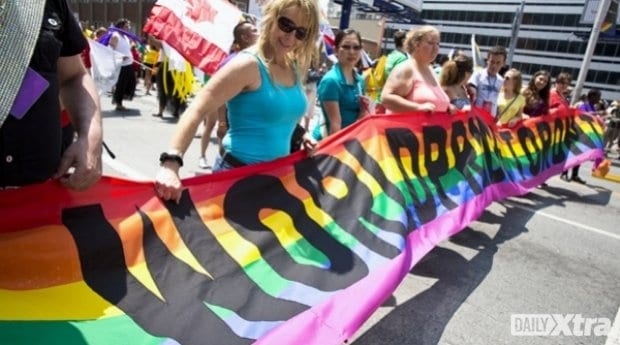The sheer volume of people blew my mind. Thousands and thousands of people meandered freely down Church Street, enjoying a nine-block, three-day street party in the heart of Toronto’s gay village, without a barricade in sight.
Sure, there were a few waist-high fences tucked discreetly around bar entrances, reminding people to consume their alcohol within the makeshift patios before venturing back into the street, but they cast no shadow over the uninhibited expanse of vibrant pedestrian space.
There were no gates to control this street fair, no admission fees to pay. Instead, donation pillars dotted the intersections, inviting participants to contribute as much or as little as they wanted.
My walk back to the hotel each night was punctuated by bursts of song from at least five open-air stages as headliners like Carly Rae Jepsen invited us to call her, maybe, and people in all states of dress and undress weaved in and out of the carefree crowds.
Undeterred by the final night’s downpour, one group of Church Street revellers broke into an impromptu rendition of Journey’s “Don’t Stop Believin’,” serenading a gaggle of nearly naked people partying wetly on the roof above them, who were only too happy to chime in on the chorus.
The previous day I’d been moved to tears by the sheer volume of WorldPride’s Dyke March: a 45-minute full-on parade of proud, noisy women reclaiming the downtown thoroughfares ringing the gay village. Friday night’s trans marches were equally inspiring — the largest I’ve ever seen, with both an official march and the independent community gathering invited to lead the way.
Only the Pride parade itself was a disappointment. With 12,000 marchers and about 300 floats, it clocked in at nearly six hours in the hot sun.
Had the parade, like the street party, celebrated an uninhibited expression of community culture, presence and joy, I might not have minded. But aside from a few inspired contingents, like the Catholic-school teachers who defied their colleagues to support gay students, the parade was long, tame and boring. And barricaded!
Though the street party presented an enviable example of largely fence-free fun, the parade was disconnected from its community by tall metal fences that penned people 10-deep on the sidewalk and cut them off from the participants marching by.
By the end of the first hour, I missed Vancouver.
Though our parade can be long and tame, too, it’s still more connected to the community it’s intended to celebrate. Few barricades separate us from our friends and neighbours marching by, and though corporate floats are staking an increasing claim to our parade, too, the Vancouver Pride Society makes a conscious effort to stagger their presence so they don’t overshadow the smaller community groups.
Unchecked in Toronto, the pressures from corporate, union and police groups eager to show their support submerged what should have been the biggest gay parade Canada has ever seen.
Sheer volume can be a powerful force. Bursting from within our community, it can fuel a vibrant street party — provided the organizers create a minimally regulated space, then step back to let the celebrations unfold. But coming from external forces, it can inundate a once-community parade and strip its spirit.
The challenge is knowing which volume to contain and which to stoke, then set free. Vancouver has room to grow in some areas; Toronto has cause to scale back in others. The lessons from WorldPride go both ways.
We may not come close to the volume of WorldPride, Vancouver, but we have reason to be proud. Here’s to our continued growth, checked and unchecked in all the right places.
Robin Perelle is the managing editor of Xtra Vancouver.

 Why you can trust Xtra
Why you can trust Xtra


